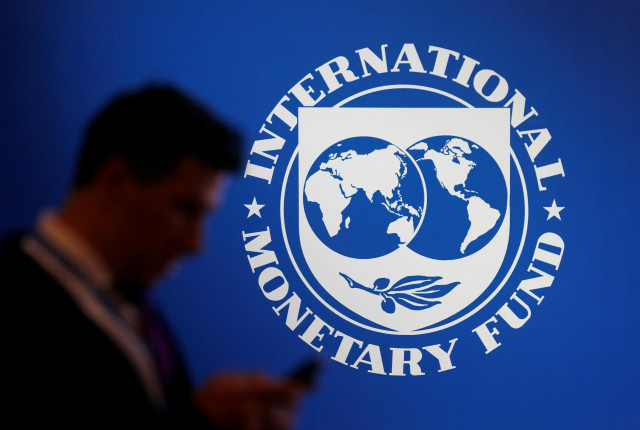IMF sees steady signs of economic stability
Staff-level agreement reached with Pakistan for release of $450m second tranche on Dec 19

PHOTO: REUTERS
The IMF has cut its inflation forecast for Pakistan from 13% to 11.8% for this fiscal year 2019-20. But it has kept the overall macroeconomic projections largely unchanged.
Pakistan and the IMF mission reached the agreement on the first review under the Extended Arrangement (EFF), which, subject to the Executive Board meeting, would pave the way for release of $450 million second loan tranche on December 19th.
IMF requests Pakistan's parliament to help increase SBP’s autonomy
All performance criteria for end-September were met with comfortable margins and progress continues towards meeting all structural benchmarks, the IMF stated in a handout issued at the conclusion of the talks.
Pakistan met the conditions on net international reserves, reduction in net foreign currency swaps, reduction in primary deficit, zero borrowing from the central bank and cap on issuance of new sovereign guarantees.
An IMF mission led by Ernesto Ramirez Rigo visited Islamabad from October 28 to November 8, 2019 to conduct the first review under the EEF. The government’s policies have started to bear fruit, helping to reverse the build-up of vulnerabilities and restore economic stability, said the IMF.
The external and fiscal deficits are narrowing, inflation is expected to decline, and growth, although slow, remains positive, it added. However, it said that sustaining sound policies and advancing structural reforms remain key priorities to enhance resilience and pave the way for stronger and sustainable growth.
The IMF stressed the need for implementation of the Financial Action Task Force action plan, and implementing structural reforms and advancing power sector reforms, as committed by Pakistan with the international lenders.
“The Pakistani authorities and IMF staff have reached a staff-level agreement on policies and reforms needed to complete the first review under the EFF. The agreement is subject to approval by IMF management and the Executive Board of Directors,” Rigo said.
Completion of the review will enable disbursement of SDR328 million or around $450 million and will help unlock significant funding from bilateral and multilateral partners, Rigo, the IMF’s Mission Chief to Pakistan, added.
“The near-term macroeconomic outlook is broadly unchanged from the time of the programme approval, with gradually strengthening activity and average inflation expected to decelerate to 11.8% in fiscal year 2019-20.”
However, domestic and international risks remain, and structural economic challenges persist.
IMF keeps macroeconomic projections unchanged
Rigo said that despite a difficult environment, programme implementation has been good, and all performance criteria for end-September were met with comfortable margins. Work continues towards completing the remaining structural benchmarks for end-September.
Significant progress has been made in improving the AML/CFT framework, although additional work is needed before March 2020, stated Rigo. He added that the international partners also remained committed to supporting the authorities’ reform efforts, providing the necessary financing assurances.
“On the macroeconomic front, signs that economic stability is gradually taking hold are steadily emerging”, said Rigo. The IMF did not disclose whether it was retaining the 2.4% economic growth rate for this fiscal year.
The IMF chief said that external position was strengthening, underpinned by an orderly transition to a flexible, market-determined exchange rate by the State Bank of Pakistan (SBP) and a higher-than-expected increase in SBP’s net international reserves.
Budgetary revenue collections were growing on the back of efforts on tax administration and policy changes and despite the ongoing compression in import-related taxes, said the IMF. But it did not mention whether the Fund was ready to cut the Rs5.503 trillion revenue collection target, which cannot be achieved in the given circumstances.
“Inflation pressures are expected to recede soon, reflecting an appropriate monetary stance,” said Rigo. Importantly, measures to strengthen the social safety net are being implemented, and development spending is been prioritised.
Rigo said that discussions focused on policies to support Pakistan achieve strong and balanced growth. He added that Pakistan needs to maintain fiscal prudence to reduce fiscal vulnerabilities, including by carefully executing the fiscal year 2019-20 budget.
Rigo said that there was also a need for implementing the new public finance management legislation, and continuing to broaden the tax base by removing preferential tax treatments and exemptions, while protecting critical social and development spending.
Advancing the strategy for electricity sector reforms, agreed with international partners, is important to put the sector on a sound footing, and remove recurrent arrears and accumulation of debt.
An official of the Power Division said that the IMF asked to completely address the circular debt problem before end of next calendar year. It also sought to address the nearly Rs850 billion circular debt that is parked in the Pakistan Holding Limited, he added.
Further efforts to strengthen SOE governance and operations, advance anti-corruption reform, and improve the business environment are key to mobilise investment and support growth and job creation.
The authorities recognise that decisive implementation of these policies is indispensable for entrenching macroeconomic stability and restoring robust and balanced growth, according to the IMF statement.



















COMMENTS
Comments are moderated and generally will be posted if they are on-topic and not abusive.
For more information, please see our Comments FAQ